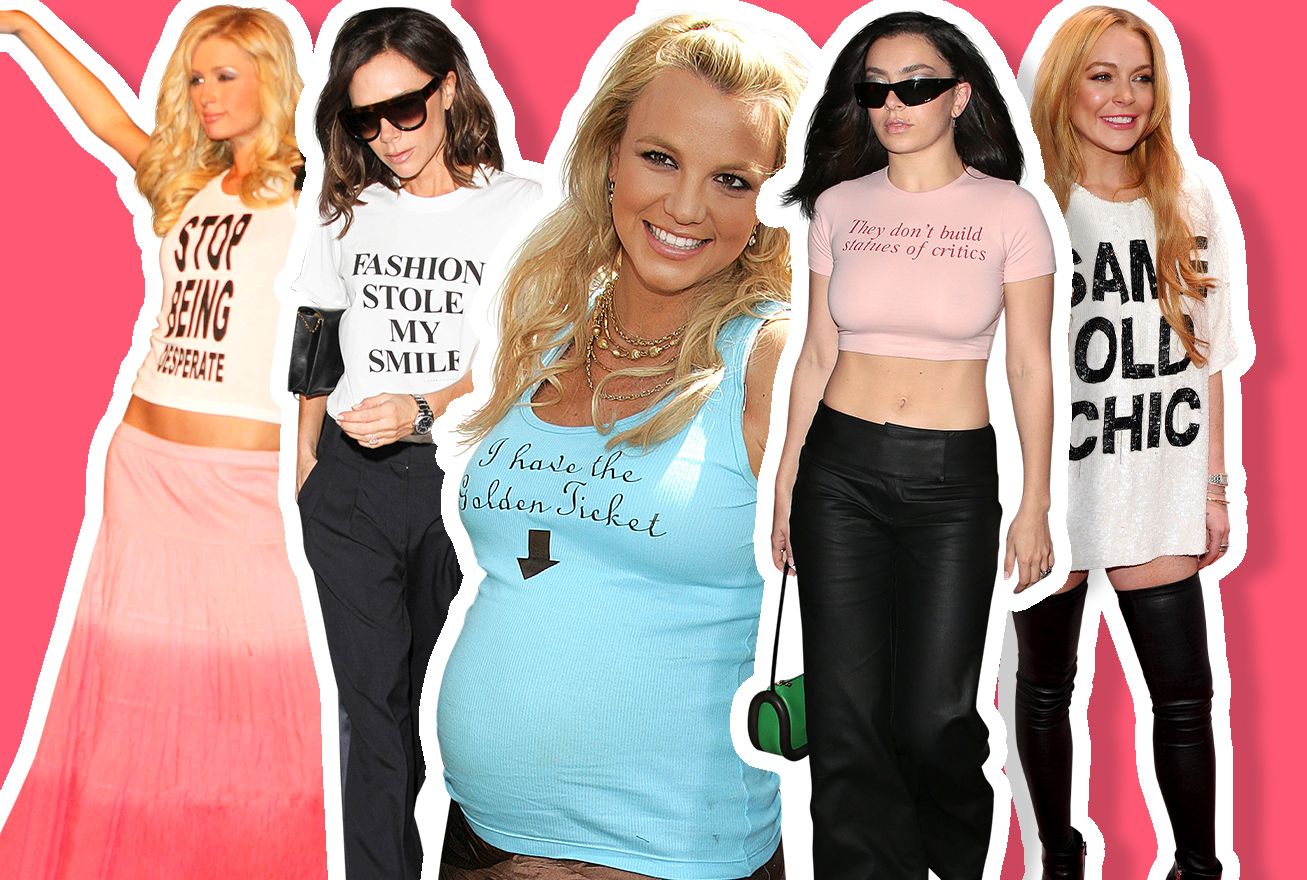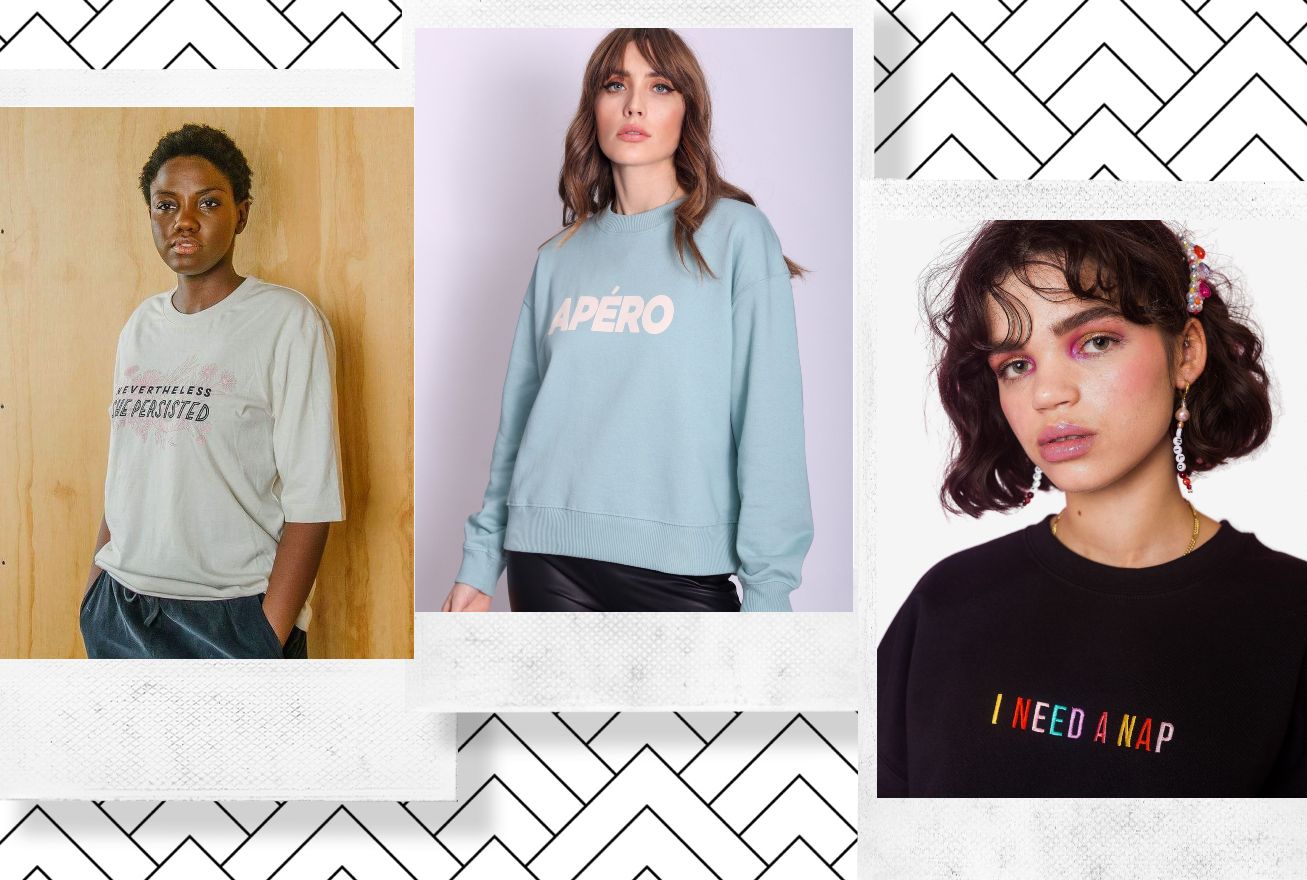If an image is price a thousand phrases, then the outfit worn in stated picture have to be shouting on the very high of its lungs.
Whether or not you’re an ardent trend lover or a mere clothes-wearer, the ability of favor to supply a primary impression is undisputed. Garments telegraph that means and messages in a means that requires the wearer to say nothing in any respect.
It’s with exactly this type of clothes-as-power pondering that we’re capable of report the perfect post-pandemic technique to make an announcement – one which the style set is loving – is the clapback T-shirt.
Type’s blundering comeback child, in latest weeks the standard clapback T-shirt has reared its head from the 00s grave as a bevy of well-known faces have used their tops to inform society exactly what they’re pondering.
Within the week following the discharge of her most up-to-date album, Crash, Charli XCX bit again on the acerbic-tongued critics who’d slated her work by carrying a tiny T-shirt that despatched a transparent message. Crafted by New York model Praying, the blush pink high learn: “They don’t make statues of critics”, which immediately set trend’s collective tongue wagging.
Kitsch label Praying, which was based by buddies in 2020, has constructed up a cult following for its tongue-in-cheek sartorial irony, with Rosalía, Megan Thee Stallion and Olivia Rodrigo amongst its followers. Slogans included in Praying’s providing embrace ‘God’s Favorite’, ‘Angel By Day’ and ‘Primary Character’ – a nod to the commentary gaining cadence about whether or not or not individuals possess primary character vitality.
It’s no shock that slogans have gotten a agency trend favorite, notably in a time of rising political ambiguity. “Slogans assist us talk our allegiance way more simply than by clothes alone,” says Carolyn Mair, behavioural psychologist and creator of The Psychology Of Vogue. “Slogans allow us to broadcast with out the hassle of constructing a vocal assertion or assuming our observers perceive our message as supposed.”
“Clothes is a means of expressing our self-identity,” Mair provides, “What we predict our clothes says – or what we wish it to say – could also be very completely different from what others suppose it says, which a slogan makes very clear.”
The urge for food for slogans is obvious. Based on world trend platform Lyst, searches for slogan items have steadily risen by 37% every month since September, and likewise notes that slogan tank tops are among the many sought-after items.
In 2019, designer Christopher Kane launched Extra Pleasure as a “fearless and relatable counterpart” to his eponymous model. Among the many London diffusion label’s bestselling items are T-shirts emblazoned with the phrases “Intercourse”, “Particular” and “Extra Pleasure”.
“Our Extra Pleasure prospects are a youthful age group that join most with us digitally,” Kane tells Stylist. “We wished to do one thing for them; one thing genuine that mirrored our shared values of enjoyment, connection and enjoyable.”
There’s a legion of manufacturers following the slogan swimsuit, too. Designer Vanna Youngstein’s T-shirts have equally channelled a way of digital-first, tongue-in-cheek irony. When Alexa Demie’s character Maddy wore the label’s “Don’t be jel” T-shirt in the course of the second season of Euphoria, it swiftly offered out.
The identical is true of Nii Hai, a model additionally revered for its playful digital acerbity, with T-shirts amongst its providing studying “Blow Me” and “I Miss My Ex”, which takes the type of the European flag, a nod to the UK’s calamitous exit from the political union.
The pattern was kickstarted, as a lot of immediately’s ubiquitous traits had been, within the early 00s, when paparazzo and tabloid fame was at its zenith. All too conscious of the flexibility to ship a message by extremely choreographed, extremely performative publicity stunts, celebrities started telling the press – and therein, the general public – exactly what they wished to be stated by way of their T-shirts.
In 2002, Britney Spears was lauded for carrying a “Dump Him” T-shirt within the weeks following her break-up with Justin Timberlake, throughout which he had reportedly moved on with Alyssa Milano.
Lindsay Lohan, a fellow fixture of the early 00s tabloid tradition, sported a fitted T-shirt that learn “Skinny Bitch”, which was interpreted as a riposte to the headlines deeming her too skinny. Madonna hit again on the press’s obsession along with her Kabbalah faith by sporting a T-shirt studying “Cult Member” when leaving its LA centre in 2004, whereas Katy Perry used a T-shirt emblazoned with the slogan “Nasty Girl” on it as she joined presidential candidate Hillary Clinton on the marketing campaign path in 2016.
“Slogans instantly establish us with a specific social group and dissociate us from different teams” Mair explains. “This sense of belonging provides us delight and is described in social psychology by the speculation of social cohesion.”
The ability in garments is channelled by slogans, suggests Mair, as they’re nearly unattainable to overanalyse. “No matter our slogans says, it eases communication and reduces the danger of confusion.”
Someplace lining the rail of a retailer someplace, we don’t doubt there’s a T-shirt for that too.



